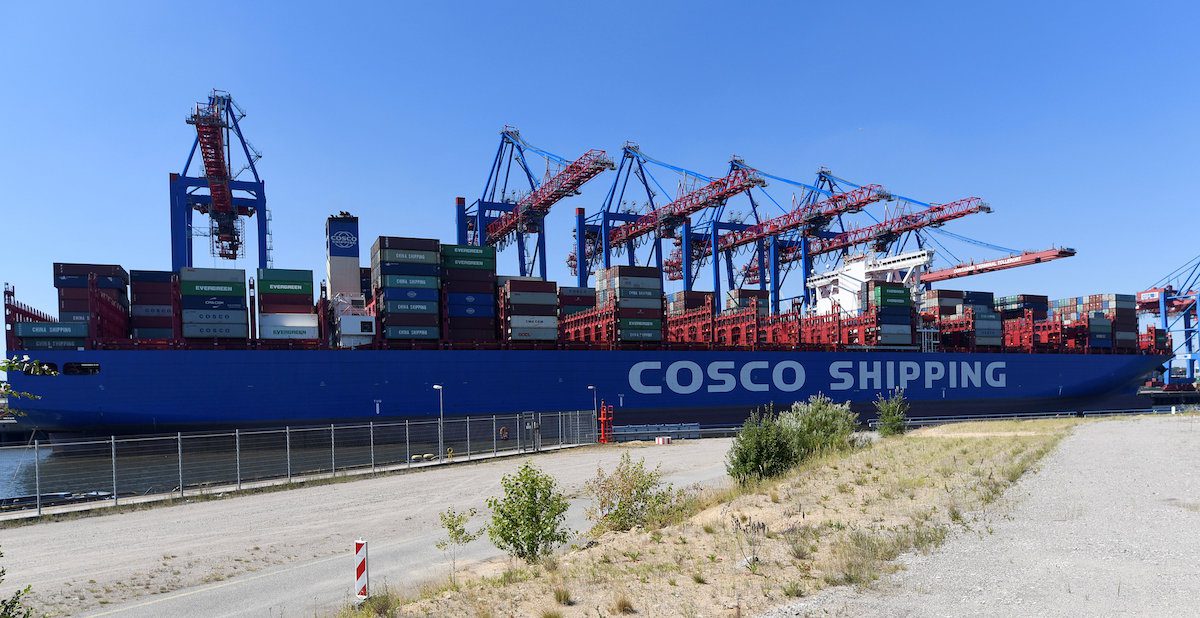FILE PHOTO: Chinese container ship “Cosco Shipping Aries” is unloaded at a loading terminal in the port of Hamburg Germany July 27, 2018. REUTERS/Fabian Bimmer/File Photo
 By Stanley Carvalho ABU DHABI, Dec 10 (Reuters) – China’s Cosco Shipping Ports Ltd plans to expand its container terminal in Abu Dhabi in the next three to five years with an investment of $200 million as more Chinese companies set up in the emirate, its vice-chairman and managing director said.
By Stanley Carvalho ABU DHABI, Dec 10 (Reuters) – China’s Cosco Shipping Ports Ltd plans to expand its container terminal in Abu Dhabi in the next three to five years with an investment of $200 million as more Chinese companies set up in the emirate, its vice-chairman and managing director said.
Cosco’s new container terminal, with a capacity of 2.5 million TEUs (Twenty-foot equivalent units) at Abu Dhabi’s Khalifa Port, was inaugurated on Monday. Cosco has spent $300 million on the terminal and $130 million on a container freight station after it won a contract in 2015 from Abu Dhabi Ports.
The bulk of China’s non-oil trade with the United Arab Emirates currently goes through Dubai, the regional hub, but Abu Dhabi is hoping to take some of that business as it invests billions in infrastructure, industry and tourism to diversify its economy away from oil.
Dubai’s Jebel Ali port is much larger and only about 40 km (25 miles) north along the coast.
The capacity at the Abu Dhabi terminal could be expanded by one million TEUs, Zhang Wei told reporters.
“A lot of Chinese companies will make investments here, it will make the Abu Dhabi economy robust,” he said. “The UAE is a gateway country to the Gulf and can easily support multiple ports.”
One of Cosco’s biggest container ships, with capacity of 20,000 TEUs, will also call on Khalifa Port, he said, predicting more volume and lower freight costs for containers entering or leaving Abu Dhabi.
Chinese companies are increasingly seizing opportunities in the Gulf as Beijing seeks to expand overseas with its ambitious Belt and Road trade and infrastructure plan.
Foreign direct investment from Chinese companies in Abu Dhabi’s Khalifa Industrial Zone has reached $1 billion, officials said in April.
With the opening of Cosco’s new terminal, total capacity at Khalifa Port will go up to 5 million TEUs. An existing terminal, managed by Abu Dhabi Ports, has a capacity of 2.5 million TEUs.
Abu Dhabi Ports’ container terminal expects throughput to touch 1.6 million TEUs in 2018 versus 1.4 million TEUs last year, said Captain Mohamed al-Shamisi, chief executive of Abu Dhabi Ports.
In 2019, throughput is expected to double to over 3 million TEUs as more shipping lines come to Abu Dhabi, he added. (Reporting by Stanley Carvalho Editing by Giles Elgood)
(c) Copyright Thomson Reuters 2018.

 Join The Club
Join The Club











